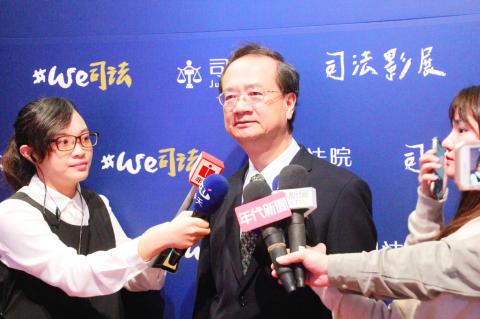Any law that follows from the passage of referendums initiated by groups opposed to same-sex marriage cannot contradict the Council of Grand Justices’ Interpretation No. 748, as it came from the highest ranks of the legal hierarchy, the Judicial Yuan said yesterday.
Interpretations from the grand justices have equal legal weight as the Constitution, Judicial Yuan Secretary-General Lu Tai-lang (呂太郎) told a meeting of the legislature’s Judiciary and Organic Laws and Statutes Committee in Taipei.
Although two referendums were passed that oppose amending the Civil Code to allow for same-sex marriage, the Legislative Yuan cannot pass laws that oppose the interpretation, Lu said.

Photo: Wu Cheng-feng, Taipei Times
The decision delivered on May 24 last year states that provisions in the Civil Code that define marriage as between a man and a woman contravene the Constitution, and required that new regulations be introduced within two years to protect marriage equality.
All three referendums initiated by the Coalition for the Happiness of Our Next Generation were passed on Saturday.
They proposed excluding education about gay people from elementary and junior-high schools, restricting the Civil Code’s definition of marriage to a union between a man and woman, and drafting a separate law to protect same-sex marriage.
Two referendums supporting the inclusion of same-sex marriage in the Civil Code and the teaching of gender-equality education in elementary and junior-high schools were rejected.
Executive Yuan spokeswoman Kolas Yotaka on Sunday said that the government would draft a separate law in three months to extend equal marriage rights to same-sex couples.
Separately yesterday, Judicial Yuan President Hsu Tzong-li (許宗力) on the sidelines of the opening of a film festival in Taipei offered words of encouragement to the nation’s LGBT community.
After the referendum results were announced, the Judicial Yuan heard from some LGBT people who had contemplated suicide because of the results, Hsu said.
“I want to use this opportunity to call on people who supported the failed pro-LGBT referendums to not lose their spirit, to be emotionally strong and to not feel disappointed,” Hsu said.
The rights of the LGBT community have already been protected by the interpretation, which would not be affected by the referendums, he added.
However, the referendum results would have a legally binding effect on the administrative and legislative branches of the government, which might have to protect marriage equality via a separate law, Hsu said.
A separate law would not necessarily afford unequal treatment to the LGBT community, as it would depend on its content, he added.

ROLLER-COASTER RIDE: More than five earthquakes ranging from magnitude 4.4 to 5.5 on the Richter scale shook eastern Taiwan in rapid succession yesterday afternoon Back-to-back weather fronts are forecast to hit Taiwan this week, resulting in rain across the nation in the coming days, the Central Weather Administration said yesterday, as it also warned residents in mountainous regions to be wary of landslides and rockfalls. As the first front approached, sporadic rainfall began in central and northern parts of Taiwan yesterday, the agency said, adding that rain is forecast to intensify in those regions today, while brief showers would also affect other parts of the nation. A second weather system is forecast to arrive on Thursday, bringing additional rain to the whole nation until Sunday, it

LANDSLIDES POSSIBLE: The agency advised the public to avoid visiting mountainous regions due to more expected aftershocks and rainfall from a series of weather fronts A series of earthquakes over the past few days were likely aftershocks of the April 3 earthquake in Hualien County, with further aftershocks to be expected for up to a year, the Central Weather Administration (CWA) said yesterday. Based on the nation’s experience after the quake on Sept. 21, 1999, more aftershocks are possible over the next six months to a year, the agency said. A total of 103 earthquakes of magnitude 4 on the local magnitude scale or higher hit Hualien County from 5:08pm on Monday to 10:27am yesterday, with 27 of them exceeding magnitude 5. They included two, of magnitude

CONDITIONAL: The PRC imposes secret requirements that the funding it provides cannot be spent in states with diplomatic relations with Taiwan, Emma Reilly said China has been bribing UN officials to obtain “special benefits” and to block funding from countries that have diplomatic ties with Taiwan, a former UN employee told the British House of Commons on Tuesday. At a House of Commons Foreign Affairs Committee hearing into “international relations within the multilateral system,” former Office of the UN High Commissioner for Human Rights (OHCHR) employee Emma Reilly said in a written statement that “Beijing paid bribes to the two successive Presidents of the [UN] General Assembly” during the two-year negotiation of the Sustainable Development Goals. Another way China exercises influence within the UN Secretariat is

Taiwan’s first drag queen to compete on the internationally acclaimed RuPaul’s Drag Race, Nymphia Wind (妮妃雅), was on Friday crowned the “Next Drag Superstar.” Dressed in a sparkling banana dress, Nymphia Wind swept onto the stage for the final, and stole the show. “Taiwan this is for you,” she said right after show host RuPaul announced her as the winner. “To those who feel like they don’t belong, just remember to live fearlessly and to live their truth,” she said on stage. One of the frontrunners for the past 15 episodes, the 28-year-old breezed through to the final after weeks of showcasing her unique